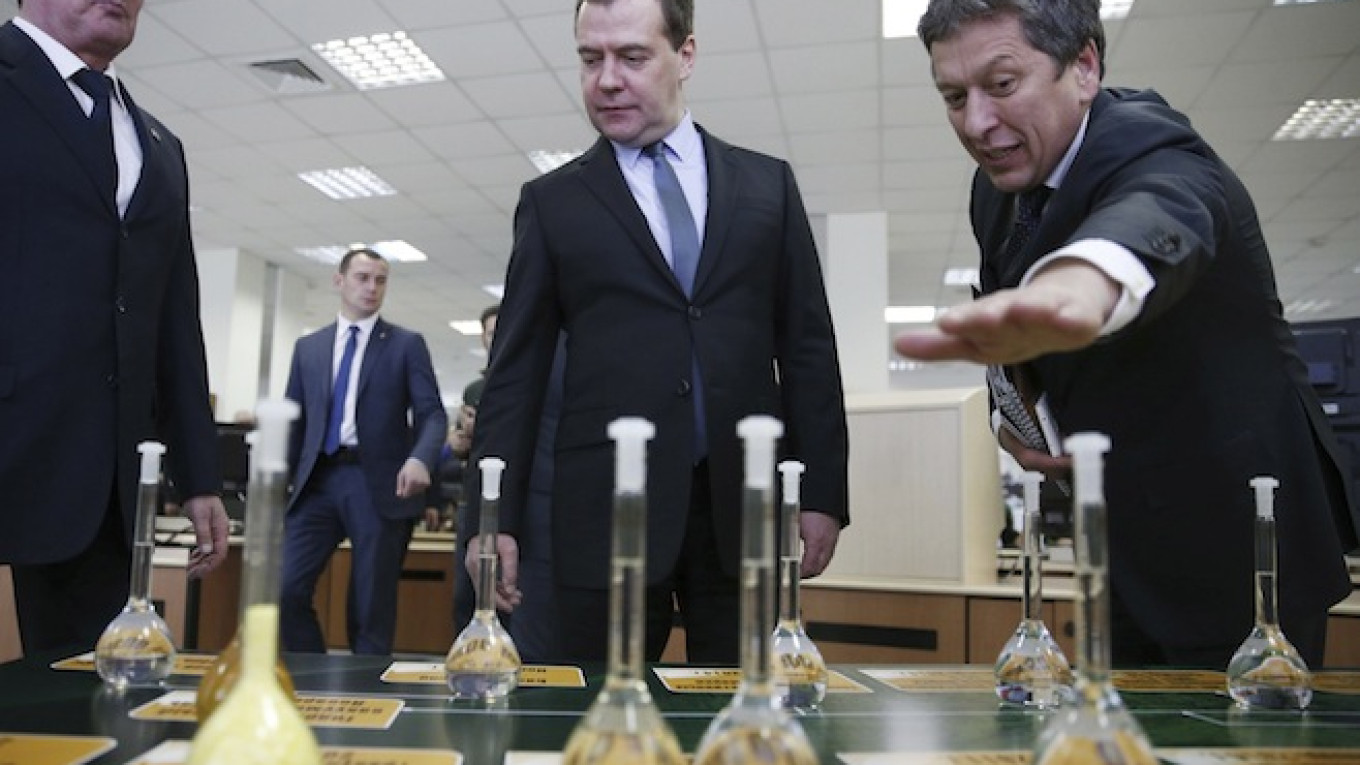As Russia grapples with the impact of plunging energy prices and a contracting economy on its government finances, painful cuts in state spending have become unavoidable.
But rather than touch sizeable defense and social expenditures backed by President Vladimir Putin, the axe is most likely to fall on infrastructure projects that are important for reviving long-term economic growth, analysts say.
The 30 percent slide in oil prices has blown a huge hole in state finances, forcing Finance Minister Anton Siluanov to admit last month that revenues, half of which come from energy taxes, could fall about a trillion rubles ($18.8 billion) next year.
The Central Bank spent $700 million to help the ruble on Monday, even though the currency was last month allowed to float freely. The Finance Ministry denied it would impose capital controls despite the ruble hitting new lows against the dollar.
The economy drive has started at the top: Putin has already ordered a freeze on Kremlin officials' salaries next year.
But fearful of provoking unrest, or looking weak internationally, the Russian leader seems reluctant to cut the very areas of spending which many analysts say are the most obvious candidates for fat-trimming.
"Some priorities won't suffer, with a high probability — in my view it is social expenditures ... and also defense expenditures, given the political situation," said Yulia Tsepleava, chief economist at Sberbank.
"Investments will probably suffer more than we expected previously. This is a big point," she added.
Putin has already had a taste of discontent. Reforms to the healthcare system, facing a 21 percent cut in federal spending under existing plans, sent thousands of health workers into the streets to protest against job losses.
But he seems committed to protecting defense spending — now seen as a priority given Russia's confrontation with the West over Ukraine — and protecting public sector wages, promises he made to get reelected in 2012.
Russia has some room for maneuver. It has $90 billion in a budget reserve fund, some 5 percent of GDP, that can cover shortfalls for a couple of years.
The budget is also cushioned by a 40 percent fall in the ruble against the dollar that boosts oil tax revenues, which may explain the authorities' relatively passive reaction to the ruble's slide.
Holes
But changes must be made. Parliament approved the three-year budget just two weeks ago which assumed an oil price of $100 per barrel in 2015-17.
Now, Russia expects the oil price to average $80 next year, and the economy to contract by 0.8 percent, reflecting the impact of Western sanctions imposed over the Ukraine crisis as well as the lower oil price. The current price is around $70.
In their discussions of cutbacks, officials have been largely silent on a 30 percent boost in defense spending next year. Defense will swallow up 4.2 percent of Russia's gross domestic product, a higher share than in the United States and more than double the European average.
"Here (with defense spending) undoubtedly one ought to reconsider priorities," said Igor Nikolaev, director of strategic analysis at FBK, a Moscow audit and consulting firm. "But considering how the political situation is seen by the authorities, one can't hope for this."
When it comes to spending on social items, the room for maneuver is limited. With his eyes on reelection in 2018, Putin has insisted that election promises to boost public sector workers' pay be honored.
Analysts say the brunt of budget cuts is instead likely to be borne by long term economic development programs, some of which are still largely on paper and easier to shelve.
"Traditionally, in difficult situations, we cut investments — it's roads, transport infrastructure — which one doesn't want to do because these investments can have a multiplier effect [on the economy,]" said Nikolaev.
Russia had been planning to spend tens of billions of dollars on infrastructure over the coming years to compensate for years of underinvestment. Projects linked to the 2018 soccer World Cup alone have been costed at 664 billion rubles ($12.6 billion), half to come from the federal budget.
Russia has dozens of socalled Targeted Federal Programs, multiyear plans covering everything from regional development to space exploration as well as transport projects, and costing close to 1 trillion rubles each year.
The government commission set up to study cutbacks has focused on these programs, criticizing several for poor efficiency. For example, a 5 trillion ruble program to develop transport links in 2010-15 failed either to join up the country, or to boost business, it concluded.
But while Russia has plenty of room for efficiency gains, economists fear cutbacks will exacerbate the structural bottlenecks behind Russia's economic malaise, weighing on long-term growth even after the present financial shocks pass.
A Message from The Moscow Times:
Dear readers,
We are facing unprecedented challenges. Russia's Prosecutor General's Office has designated The Moscow Times as an "undesirable" organization, criminalizing our work and putting our staff at risk of prosecution. This follows our earlier unjust labeling as a "foreign agent."
These actions are direct attempts to silence independent journalism in Russia. The authorities claim our work "discredits the decisions of the Russian leadership." We see things differently: we strive to provide accurate, unbiased reporting on Russia.
We, the journalists of The Moscow Times, refuse to be silenced. But to continue our work, we need your help.
Your support, no matter how small, makes a world of difference. If you can, please support us monthly starting from just $2. It's quick to set up, and every contribution makes a significant impact.
By supporting The Moscow Times, you're defending open, independent journalism in the face of repression. Thank you for standing with us.
Remind me later.


